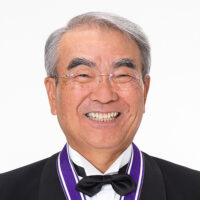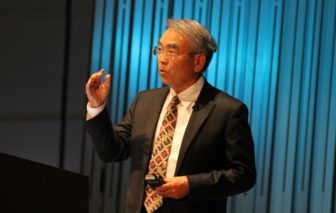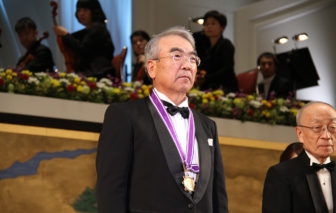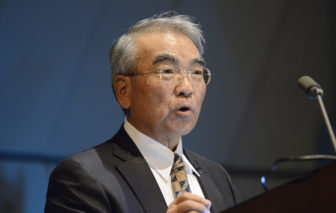
2016 Kyoto Prize Laureates
Information Science
/ Roboticist
1945 -
U. A. and Helen Whitaker University Professor, Carnegie Mellon University
Think like an Amateur, Do as an Expert: Fun Research in Computer Vision and Robotics
2016
11 /11 Fri
Place:Kyoto International Conference Center
Society in 20 Years Later Depicted by Computer Vision Research
2016
11 /12 Sat
10:30 - 17:30
Place:Kyoto International Conference Center
Dr. Kanade has made fundamental contributions to the basic theory of computer vision and introduced a series of innovative applied technologies in robotics including pioneering achievements in the field of automated driving. He has established the foundation of this academic field and been advancing its frontiers consistently for many years.
Dr. Takeo Kanade has devoted much of his life to researching and developing computer vision technologies, from fundamental theories to real-world applications in the field of robotics. Today, cameras and robots with intelligent visual functions are expected to offer solutions to various social problems and Dr. Kanade has made significant contributions to the foundation of these technologies and brought many new concepts into practical reality.
His pioneering research on computer-based image recognition led him to propose face detection technologies using neural networks. This method raised the detection rate to an unprecedented and practical level.
Dr. Kanade was also engaged in research on recognition of three-dimensional structures and motions using video and then went on to propose a robust and fundamental algorithm for optical flow to estimate the direction and speed of a moving object with video images. He also developed a three-dimensional reconstruction method for moving objects in video based on singular value decomposition. These methods have been fundamental to the modern image processing, and made substantial progress in the methods to recognize dynamic three dimensional world using input image.
One of his most profound achievements relates to automated driving. In 1985, his autonomous vehicle project formed the early foundation for the recent emergence of autonomous driving technologies. He was the first researcher in the world to create an artificial intelligence system capable of sensing freeway lanes, executing accurate lane changes, recognizing and avoiding obstacles, and detecting other vehicles in real time based on data from vehicle-mounted range sensors and cameras. His team carried out a superb demonstration called “No Hands Across America,” the idea of which was to traverse the North American continent by car without touching the steering wheel. Researchers drove approximately 4,500 kilometers, from Pittsburgh to San Diego, with hardly any use of the steering wheel. This groundbreaking demonstration was extremely significant in showing the future potential for fully automated driving.
As described above, Dr. Kanade’s achievements cover a widespread area from scientific basic research to practical research. He has outstandingly contributed in the field of image processing and pattern recognition by putting forth basic and theoretical frameworks, and developing extraordinary practical technologies.
For these reasons, the Inamori Foundation is pleased to present the 2016 Kyoto Prize in Advanced Technology to Dr. Takeo Kanade.
Profile is at the time of the award.

Dr. Takeo Kanade Receives the John Scott Award
Dr. Takeo Kanade, the 2016 Kyoto Prize laureate in Advanced Technology, received the John Scott Award.

Dr. Takeo Kanade Receives the BBVA Foundation Frontiers of Knowledge Award
Dr. Takeo Kanade , the 2016 Kyoto Prize laureate in Advanced Technology, received the BBVA Foundation Frontiers of Knowledge Award in the Information and Communication Technologies category.

Dr. Takeo Kanade Receives the Kyoto Prefecture Cultural Award!
Dr. Takeo Kanade, the 2016 Kyoto Prize laureate in Advanced Technology, received the 40th Kyoto Prefecture Cultural Award (Distinguished Achievement) on January 6, 2022.